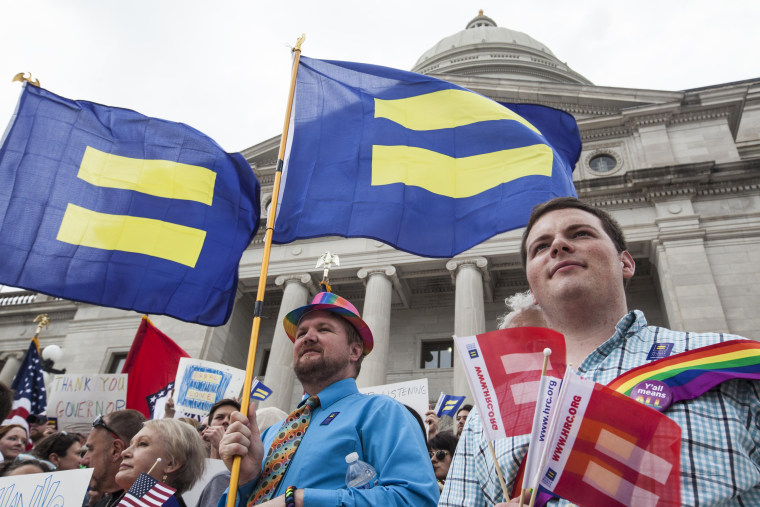In the wake of the controversy over religious freedom laws in Indiana and Arkansas, most Americans say that a business owner should treat gays and lesbians as they would other customers, even if homosexuality violates that business owner’s religious beliefs. The latest NBC News Online Survey conducted by SurveyMonkey also showed why so many large retailers and corporations spoke out against these laws: 48% of Americans said they would likely boycott a business that refuses to provide services to gays or lesbians.
The poll found that 63% of Americans say business owners should be required to provide products or services to individuals who are gay or lesbian, while 37% say the business owner should be allowed to refuse if homosexuality is against their religious beliefs. But Americans were divided on the issue if the business provides some kind of wedding services.
RELATED: Scaled-back religious freedom bill becomes law in Arkansas
Indiana Gov. Mike Pence and Arkansas Gov. Asa Hutchinson, both Republicans, came under intense criticism over Religious Freedom Restoration Acts in their states, which critics warned could sanction discrimination against gays and lesbians. Politicians, celebrities and business leaders spoke out against the legislation. In Indiana, the Indianapolis-based NCAA expressed concern over the legislation. In Arkansas, the state's largest employer, Wal-Mart, put pressure on Gov. Asa Hutchinson. In both Indiana and Arkansas, the laws were scaled back.
Half of the poll's respondents were given slightly different question wording, and the results showed that opinions of some Americans vary regarding the type of business. When asked if a wedding-related business, such as a caterer or photographer, should be required to provide products or services to same-sex couples, 52% said they should provide services, while 48% said they should be allowed to refuse.
Republicans come down in favor of business owners’ religious freedom, with nearly two-thirds saying the owners can refuse to serve gays. This is in stark contrast to the 82% of Democrats and 63% of independents who support equal service for all.
Across all ages and races, Americans say a business must serve gays and lesbians no matter the owner’s religious beliefs. But older Americans and whites have somewhat more conservative views on the issue when it came to wedding businesses.
Among those under 45, a majority say wedding businesses should be required to provide services, but those over 45 say these operations should be allowed to refuse based on the owner's religious beliefs. Whites are nearly evenly divided on wedding businesses, but not blacks and Hispanics – nearly two-thirds of these groups want businesses to provide services to gays and lesbians.
And among white Americans who identified as being born-again Christians or evangelicals, support for religious freedom for business owners was very strong, with 62% supporting the right of generic business owners to refuse service and 80% saying wedding businesses should be allowed to not provide services.
RELATED: Indiana Gov. Mike Pence 'fixes' controversial religious freedom law
Forty-eight percent of Americans said they would likely boycott a company that refuses service to gays and lesbians because of the owner’s religious views, while 14% said that would make them more likely to support the business. A large number, 37%, said it wouldn’t make a difference to them. Support for a boycott ran strongest among Democrats and those under 45 years old.
The issues of religious freedom and same-sex marriage are likely to have an impact on the 2016 election. Slightly more Americans say they would vote for a candidate who supports legal gay marriage than one who focuses on conservative social and religious values.
Perhaps most important to the slate of 2016 contenders are a few key groups that can make a difference in an election: young voters, women and independents. A majority of those under 30 say they are more likely to vote for a candidate who supports gay marriage, and a similar number say they are less likely to vote for one who focuses on conservative social and religious values. Twice as many in the 30-44 age group say they would more likely cast a vote for a gay marriage supporter over a conservative values candidate. Nearly half of women said they are less likely to vote for a socially conservative candidate. And among independents, support is 15 points higher for a candidate open to gay marriage than for a socially conservative one.
The NBC News-SurveyMonkey Poll was conducted online April 6-8, 2015 among a national sample of 2,052 adults aged 18 and over. Respondents for this non-probability survey were selected from among those who have volunteered to participate in the SurveyMonkey Audience panel. Results have an error estimate of plus or minus 3.0 percentage points. A full description of our methodology can be found here. The survey was produced by the Analytics Unit of NBC News in conjunction with Penn's Program on Opinion Research and Election Studies with data collection and tabulation conducted by SurveyMonkey. Analysis by the University of Pennsylvania's Program on Opinion Research and Election Studies.
